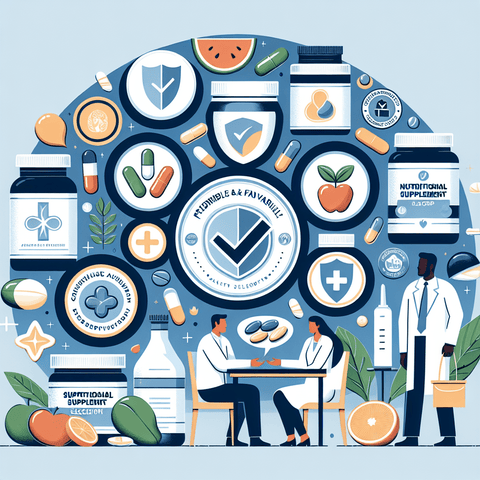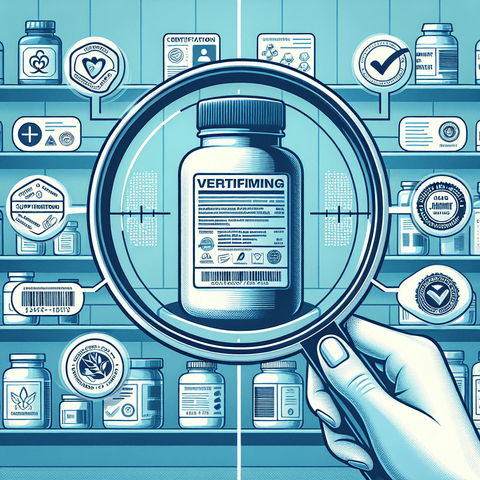Discover the Ultimate Guide to Choosing Safe and Effective Nutritional Supplements
In recent years, nutritional supplements have become a cornerstone of health and wellness routines worldwide. From boosting immune function to supporting mental clarity and athletic performance, these products are increasingly integrated into our daily lives. As supplement consumption rises, so does the importance of making informed decisions to ensure safety and efficacy. This comprehensive guide aims to equip you with the essential knowledge to select the right supplements confidently, minimizing risks while maximizing health benefits.
Understanding Nutritional Supplements: What Are They and Why Do You Need Them?
Nutritional supplements encompass a broad range of products designed to augment your diet, providing essential nutrients that may not be adequately available through food alone. These include vitamins, minerals, herbs, amino acids, enzymes, and other botanicals. Supplements can come in various forms—pills, capsules, powders, liquids—and tailored to meet diverse health needs and preferences.
The primary reasons individuals turn to supplements involve addressing nutritional gaps, supporting specific health goals, or accommodating lifestyle factors. For instance, vegetarians or vegans may need vitamin B12 supplements, while athletes might supplement with amino acids for muscle recovery. Older adults often require additional vitamin D and calcium to maintain bone health. People with certain health conditions or dietary restrictions may find supplements crucial for optimal health.
Although supplements offer valuable support, they are intended to complement, not replace, a balanced diet. Whole foods provide a spectrum of nutrients and bioactive compounds that work synergistically for health. Supplementation should be viewed as an adjunct, tailored to individual needs, and used responsibly to avoid over-reliance or potential nutrient imbalances.
Supplement Safety Tips: How to Minimize Risks and Protect Your Health
While dietary supplements can offer numerous health benefits, they carry potential risks if misused or if contaminated products are consumed. Recognizing these risks is pivotal for safe supplement intake. First, always read labels carefully. Pay attention to ingredient lists, serving sizes, and dosage directions. Understanding how much of each nutrient you are taking helps prevent toxicity—particularly with fat-soluble vitamins like A, D, E, and K, which can accumulate in the body.
Understanding possible interactions is also critical. Supplements can interact with medications or other supplements, leading to adverse effects. For example, vitamin K supplements may interfere with blood-thinning medications, so consult your healthcare provider if you are on medication. Before starting a new supplement regimen, seek professional advice, especially if you are pregnant, nursing, have chronic illnesses, or are taking prescription drugs.
Counterfeit and contaminated products pose significant health risks. To avoid these, choose supplements from reputable brands with third-party certifications such as USP, NSF International, or ConsumerLab. These organizations perform rigorous testing to ensure product purity, potency, and safety. Proper storage—keeping supplements in a cool, dry place away from direct sunlight—also maintains their efficacy while reducing spoilage risks.
Special populations, including pregnant women, seniors, or individuals with pre-existing health conditions, require further caution. These groups should consult healthcare professionals before supplementing to tailor their choices and dosages appropriately.
Evidence-Based Supplement Choices: Selecting Proven and Reliable Options
The foundation of safe supplement use rests on evidence-backed choices. Not all products are created equal—some make unsubstantiated health claims that can mislead consumers. Prioritize supplements supported by scientific research and clinical evidence. Reputable sources include government health agencies, peer-reviewed scientific journals, and trusted health organizations.
When evaluating supplement claims, focus on transparency and credible information. Look for third-party testing labels, ingredient concentrations, and clear dosage instructions. Regulatory standards vary by country; in the United States, the FDA oversees supplement safety, but it does not pre-approve products before they hit the market. Certifications from organizations like USP (United States Pharmacopeia) or NSF International provide assurance that the product has been independently tested for quality and safety.
For common health concerns, certain supplements are well-supported by research. For example, vitamin D is frequently recommended for bone health and immune support, especially in populations with limited sun exposure. Omega-3 fatty acids from fish oil support cardiovascular health, with numerous studies corroborating their benefits. You can find high-quality omega-3 supplements and other evidence-backed options at Topvitamine's Omega-3 collection.
Distinguish between fleeting trends and scientifically validated supplements. While some fad products gain popularity quickly, they may lack credible evidence. Always consult reputable research and healthcare professionals before integrating new supplements into your routine.
Quality Assurance in Supplements: Ensuring You Get What You Pay For
Quality assurance is fundamental for effective and safe supplementation. Manufacturing standards vary across brands, and products that do not adhere to Good Manufacturing Practices (GMP) can contain impurities, incorrect dosages, or contaminants. Trustworthy manufacturers undergo third-party testing and possess certifications such as USP, NSF, or ConsumerLab to verify product quality.
When shopping, scrutinize labels for transparency. Clear ingredient lists, dosing information, manufacturing and expiration dates, and batch numbers indicate good manufacturing practices. Avoid products with vague labels, unspecified ingredient quantities, or those sold outside reputable outlets. Counterfeit or substandard products are common in the supplement industry and pose health risks; verify your sources and buy from trusted vendors.
Proper storage and handling are equally important. Keep supplements in a cool, dry environment, away from heat and moisture, which can degrade their potency. Follow storage guidelines specified on the label to preserve efficacy. Regularly check expiration dates and dispose of expired products to ensure safety and quality.
Health Benefits of Supplements: Maximizing Your Wellbeing Safely
When selected appropriately, supplements can support various aspects of health: strengthening immunity, boosting energy, enhancing mental clarity, supporting cardiovascular function, improving bone density, and more. However, individual needs vary; personalized supplementation ensures optimal benefits while minimizing risks.
Matching supplements to personal health goals involves assessing dietary intake, lifestyle, and specific deficiencies. For example, individuals at risk of osteoporosis may benefit from vitamin K, which plays a pivotal role in blood and bone health. Learn more about [vitamin K benefits](https://www.topvitamine.com/collections/vitamin-k-benefits-bone-blood-health). Meanwhile, those seeking immune support might consider vitamin C, available at Topvitamine's Vitamin C collection.
Supplement use should be part of a holistic health approach—balanced diet, regular exercise, sufficient sleep, and stress management. Monitor your health regularly and track the effects of any supplements to determine their efficacy. Adjust dosages or discontinue use if adverse effects occur or if your health status changes.
Informed Supplement Selection: Making Confident and Safe Choices
Developing a systematic approach to choosing supplements enhances safety and effectiveness. Start with research: consult credible sources, healthcare providers, and scientific literature. Keep detailed records of supplement intake, noting brand, dosage, and any side effects or health changes.
Regular consultation with healthcare professionals ensures that your supplement regimen aligns with your overall health plan. Share your supplement list and discuss any potential interactions with medications. Staying updated on new scientific findings and regulatory changes helps you make informed adjustments over time.
Empower yourself as an informed consumer by educating yourself on labels, certifications, and product origins. Advocate for transparency and quality from brands. Remember that your health choices have long-term implications; prioritize safety, evidence, and product integrity in every supplement decision.
Conclusion
Choosing safe and effective nutritional supplements requires careful consideration, critical evaluation of evidence, and reliance on reputable brands and certifications. Remember that supplements are tools to support a holistic approach to health—they should supplement, not substitute, a balanced diet and healthy lifestyle. By staying informed, consulting professionals, and prioritizing quality, you can make confident decisions that enhance your wellbeing.
Empower yourself to navigate the supplement industry wisely and integrate supplements responsibly into your health routine. For trusted supplement options and expert advice, explore [Topvitamine](https://www.topvitamine.com).
Q&A Section
Q1: How do I know if a supplement is safe to take?
Check for third-party testing labels such as USP, NSF, or ConsumerLab, which verify quality and safety. Always purchase from reputable brands and trusted retailers. Consult healthcare professionals before starting new supplements, especially if you have health conditions or take medications.
Q2: Can supplements replace a healthy diet?
No, supplements are designed to supplement your diet, not replace it. Whole foods provide a complex array of nutrients and bioactive compounds that work in unison. Focus on maintaining a balanced diet alongside supplementation when necessary.
Q3: What are some evidence-backed supplements for improved immunity?
Vitamin C and vitamin D have substantial scientific support for supporting immune function. You can explore high-quality vitamin C products at Topvitamine's Vitamin C collection and vitamin D options at Topvitamine's Vitamin D collection.
Q4: How can I ensure the quality of the supplements I purchase?
Look for brands with third-party certifications like USP or NSF, read labels carefully, and buy from reputable vendors. Store supplements properly and check expiration dates regularly to ensure continued efficacy.
Q5: Are there special considerations for vulnerable populations?
Yes, pregnant women, seniors, and individuals with health conditions should consult healthcare professionals before supplementing. Doses and supplement choices may need adjustment to avoid adverse effects and interactions.
Important Keywords
- nutritional supplements
- supplement safety
- evidence-based supplements
- high-quality supplements
- supplement certifications
- vitamins and minerals
- holistic health
- regulatory standards
- third-party testing
- personalized supplementation



